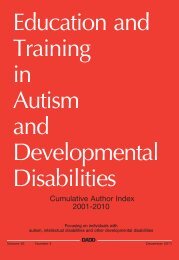Download the Journal (PDF) - Division on Autism and ...
Download the Journal (PDF) - Division on Autism and ...
Download the Journal (PDF) - Division on Autism and ...
Create successful ePaper yourself
Turn your PDF publications into a flip-book with our unique Google optimized e-Paper software.
literature, mostly to do with <str<strong>on</strong>g>the</str<strong>on</strong>g> elderly, where<br />
abuse <strong>and</strong> misuse of guardian powers were<br />
observed (Lisi et al., 1994).<br />
Jack’s situati<strong>on</strong> fur<str<strong>on</strong>g>the</str<strong>on</strong>g>r reflects <str<strong>on</strong>g>the</str<strong>on</strong>g> finding<br />
of a study c<strong>on</strong>ducted by Stancliffe et al. (2000)<br />
who found that some adults with guardians<br />
displayed self-determinati<strong>on</strong> competencies<br />
that were as good or better than o<str<strong>on</strong>g>the</str<strong>on</strong>g>rs who<br />
had not been assigned a guardian. The authors<br />
suggested that perhaps <str<strong>on</strong>g>the</str<strong>on</strong>g> self-determinati<strong>on</strong><br />
skills of some individuals steadily increased<br />
over time as a result of experiences.<br />
They also suggested that in <str<strong>on</strong>g>the</str<strong>on</strong>g>se situati<strong>on</strong>s<br />
courts should reevaluate guardian appointments<br />
or resp<strong>on</strong>sibilities, <strong>and</strong> cauti<strong>on</strong>ed that<br />
if too much time is taken to rec<strong>on</strong>sider guardian<br />
roles, <str<strong>on</strong>g>the</str<strong>on</strong>g>n a ward’s motivati<strong>on</strong> to exhibit<br />
self-determinati<strong>on</strong> may decrease, or potentially<br />
deteriorate. It is possible for individuals<br />
to petiti<strong>on</strong> <str<strong>on</strong>g>the</str<strong>on</strong>g> court to modify or remove<br />
guardian appointments. An interesting finding<br />
about Jack’s situati<strong>on</strong> is that <str<strong>on</strong>g>the</str<strong>on</strong>g> parents<br />
were adamant about family taking care of family.<br />
Curiously, <str<strong>on</strong>g>the</str<strong>on</strong>g>y did not seem to view <str<strong>on</strong>g>the</str<strong>on</strong>g><br />
court’s authority, annual reports <str<strong>on</strong>g>the</str<strong>on</strong>g>y had to<br />
submit to <str<strong>on</strong>g>the</str<strong>on</strong>g> judge, or social worker home<br />
visits as intrusi<strong>on</strong>s.<br />
It has been suggested that families need to<br />
have access to informati<strong>on</strong> to make informed<br />
choices regarding guardianship (Millar, 2003;<br />
Millar & Renzaglia, 2002). In additi<strong>on</strong> to this<br />
informati<strong>on</strong>, each family has to have individualized<br />
support <strong>and</strong> guidance by school pers<strong>on</strong>nel.<br />
Although Jack’s family believed <str<strong>on</strong>g>the</str<strong>on</strong>g>y<br />
were informed, <str<strong>on</strong>g>the</str<strong>on</strong>g>y had at times inaccurate<br />
or incomplete informati<strong>on</strong>. For example,<br />
medical issues, a main reas<strong>on</strong> for filing a petiti<strong>on</strong><br />
for <str<strong>on</strong>g>the</str<strong>on</strong>g>ir s<strong>on</strong>, may have sufficiently been<br />
taken care of in different ways (e.g., ‘next of<br />
kin,’ ‘power of attorney,’ ‘emergency/temporary<br />
guardianship). Alternatives could have<br />
been explored (see Millar, 2007 for potential<br />
alternatives), hence reducing <str<strong>on</strong>g>the</str<strong>on</strong>g> need for<br />
<str<strong>on</strong>g>the</str<strong>on</strong>g>m to write reports for <str<strong>on</strong>g>the</str<strong>on</strong>g> courts, <strong>and</strong> unnecessarily<br />
limiting <str<strong>on</strong>g>the</str<strong>on</strong>g>ir s<strong>on</strong>’s legal rights. Because<br />
legal issues can be c<strong>on</strong>fusing <strong>and</strong> complex,<br />
it is essential that members of <str<strong>on</strong>g>the</str<strong>on</strong>g><br />
judiciary (e.g., probate clerks who register<br />
guardian petiti<strong>on</strong>s, attorneys, judges) learn<br />
about self-determinati<strong>on</strong> initiatives <strong>and</strong> ways<br />
<str<strong>on</strong>g>the</str<strong>on</strong>g>y too can support individuals with disabilities<br />
to remain aut<strong>on</strong>omous. Perhaps members<br />
of <str<strong>on</strong>g>the</str<strong>on</strong>g> judiciary, ei<str<strong>on</strong>g>the</str<strong>on</strong>g>r prior to or at <str<strong>on</strong>g>the</str<strong>on</strong>g> time<br />
a petiti<strong>on</strong> for guardianship is filed with <str<strong>on</strong>g>the</str<strong>on</strong>g><br />
courts, can work with families to ensure <str<strong>on</strong>g>the</str<strong>on</strong>g>y<br />
underst<strong>and</strong> what guardianship entails <strong>and</strong> its<br />
alternatives.<br />
Limitati<strong>on</strong>s <strong>and</strong> Future Research Ideas<br />
Although this study provides important new<br />
informati<strong>on</strong>, <strong>and</strong> used sound strategies for<br />
c<strong>on</strong>ducting quality case studies (e.g., prol<strong>on</strong>ged<br />
observati<strong>on</strong>s, members checking, triangulati<strong>on</strong><br />
of data), <str<strong>on</strong>g>the</str<strong>on</strong>g>re are limitati<strong>on</strong>s. For<br />
example, in <str<strong>on</strong>g>the</str<strong>on</strong>g> selecti<strong>on</strong> of participants, it is<br />
possible that <str<strong>on</strong>g>the</str<strong>on</strong>g>y are not representative of<br />
students in similar situati<strong>on</strong>s, hence restricting<br />
<str<strong>on</strong>g>the</str<strong>on</strong>g> ability to generalize <str<strong>on</strong>g>the</str<strong>on</strong>g> findings. A<br />
case study approach was used, however, because<br />
explorati<strong>on</strong> in this area of self-determinati<strong>on</strong><br />
in relati<strong>on</strong> to guardianship for young<br />
adults is new. It is anticipated that <str<strong>on</strong>g>the</str<strong>on</strong>g> less<strong>on</strong>s<br />
learned from this study will help with designing<br />
future research endeavors where larger<br />
numbers of individuals can have <str<strong>on</strong>g>the</str<strong>on</strong>g> opportunity<br />
to participate <strong>and</strong> have <str<strong>on</strong>g>the</str<strong>on</strong>g>ir voices heard.<br />
In additi<strong>on</strong>, this study has acted as a catalyst<br />
by raising several questi<strong>on</strong>s that could be addressed<br />
in future research initiatives. For example,<br />
how, if at all, has IDEA impacted <str<strong>on</strong>g>the</str<strong>on</strong>g><br />
number of young adults having a guardian<br />
appointed? If a student’s competence is a c<strong>on</strong>cern,<br />
<str<strong>on</strong>g>the</str<strong>on</strong>g>n to what extent are IEP present level<br />
of functi<strong>on</strong>al performance statements, goals,<br />
<strong>and</strong> objectives addressing this c<strong>on</strong>cern? When<br />
educators <strong>and</strong> service providers learn of<br />
guardian appointments, does <str<strong>on</strong>g>the</str<strong>on</strong>g>ir respect for<br />
<strong>and</strong> acti<strong>on</strong>s toward <str<strong>on</strong>g>the</str<strong>on</strong>g> individual with <str<strong>on</strong>g>the</str<strong>on</strong>g><br />
disability change, <strong>and</strong> if so how? Ano<str<strong>on</strong>g>the</str<strong>on</strong>g>r<br />
questi<strong>on</strong> to investigate is how prevalent is it<br />
that families petiti<strong>on</strong> courts at <str<strong>on</strong>g>the</str<strong>on</strong>g> time a student<br />
becomes of legal age? Does <str<strong>on</strong>g>the</str<strong>on</strong>g> awareness<br />
that a young adult with a disability who<br />
has been appointed a guardian lead to that<br />
individual becoming less likely to attempt to<br />
dem<strong>on</strong>strate self-determinati<strong>on</strong> attributes, or<br />
was Jack’s situati<strong>on</strong> an excepti<strong>on</strong>? O<str<strong>on</strong>g>the</str<strong>on</strong>g>r questi<strong>on</strong>s<br />
could relate to how often guardian appointments<br />
are modified or revoked if families<br />
realize that alternatives to guardian<br />
appointments can be used.<br />
Awhile ago Halpern (1994) wrote “if <str<strong>on</strong>g>the</str<strong>on</strong>g><br />
transiti<strong>on</strong> process is to be successful, it must<br />
begin with helping students to gain a sense of<br />
empowerment with respect to <str<strong>on</strong>g>the</str<strong>on</strong>g>ir own tran-<br />
Self-Determinati<strong>on</strong> <strong>and</strong> Guardianship / 291
















